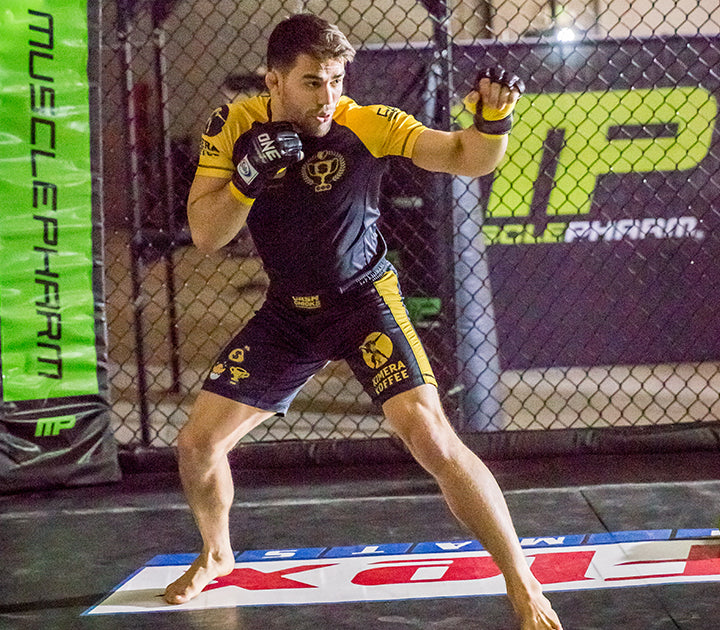
Four-time EBI champion and multiple-time IBJJF medalist Garry Tonon was at the top of his sport. But that wasn’t enough for the fighter, who is constantly looking for new ways to improve himself. He spoke with MusclePharm while preparing for his upcoming MMA debut fight and shed some light on the mindset of an elite fighter:
“Something you have to understand about jiu-jitsu, in my opinion, is that every single person that decides to do it and continue doing it, is some sort of a control freak. You have a problem.
There is a deep-seated competitive drive at the elite level of anything. Every elite fighter, they have to be abnormal. Because if they were normal, they wouldn't be at the elite level of what they do.”
Here’s what Tonon had to say about jiu-jitsu, his transition to MMA, and what drives him to be the best.
MusclePharm: What is it about jiu-jitsu that makes you love it?
Garry Tonon: I love Brazilian jiu-jitsu because it allows me to be a problem solver. I’ve always appreciated science, math, and things like that in school. But it never had that real life component that I was looking for, I couldn't get my hands on it. Brazilian jiu-jitsu stimulates the mind as well as the body, in the sense that I get to do something physical, but at the same time think about what I'm doing.
It’s also very empowering. Growing up, I was always the smaller guy. I started school a little bit earlier than most, so I was younger, smaller, weaker than everybody. And I was always searching for a way to equalize. A way to be on par with everybody else, or to feel as though I could hang with tougher, stronger people, because I never wanted to feel like I was in a situation where I didn't have power or control over my well-being.
You've been in a lot of uncomfortable positions as you rose through the ranks. In those uncomfortable and exhausting times, what was the drive that pushed you through?
A key component to success is the willingness to put yourself through absolute hell and torture. I will definitely say that it will never feel as good if you didn't go through hell to get whatever it is that you are. If you're not currently uncomfortable in some way, if you're not currently making yourself very uncomfortable, you're probably not getting better as fast as you could be. Anybody who just stays in a comfortable spot all the time is unlikely to change.
You seem to have a strong sense of camaraderie with other top-tier grapplers and martial artists, what are those relationships like and how do they impact you?
You can't expect to get the things that you want just off your own attributes, your own drive. All things in this world that are great have been achieved through the work of many, many people. If I want to be the best at something, or if I want to be an outlier at the elite level, I have to seek out other people with similar passion. Because if I don't, and I align myself with people who are of a different mindset, I'll often end up molding my mindset to those other people. So that's how I ended up building very long-lasting and powerful relationships with all these other interesting, elite-level individuals. Because I realized that a lot of what they want aligned with my main goal, which is to be the best.

You’re in a unique place because you’re at the top of your field, yet you’re setting your sights on something new. What’s going through your head and your heart during the transition from jiu-jitsu to MMA?
Jiu-jitsu was never a huge professional thing when I was coming up through the ranks, so I didn't really look at that as a potential career goal. I didn’t think that I was going to make money or a living through jiu-jitsu. And it just started to happen. But as I continued to compete, I always had aspirations of moving on and fighting professionally as well.
So I just focused on jiu-jitsu for as long as I could. But then I got to a critical point when I turned 26 years old. If I didn’t cross over into mixed martial arts, I wouldn’t have enough time to develop the skills to potentially be the best at that.
The good news is is that it's not completely different. There are prerequisite skills of jiu-jitsu that are involved in mixed martial arts, which I will end up using to the best of my ability to defeat my opponents. That'll be my edge. Submission grappling. There hasn't been too many people in recent mixed martial arts where that has been their focus. So I think I'll be a very different dynamic fighter.
Now that you're going into MMA, how do you define success in that space?
I know that one day teaching will be my main focus. And I take great pride in that. So a lot of what I do, this competing at the highest level in jiu-jitsu, testing myself in fighting, that's so that I know that the information that I'm going to be giving my students is tested and it's quality information, and I've tried it. I put my neck on the line to get that information so that when they hear me speak, it means a little bit more. I think there's many ways to teach someone, but if you can afford to do it by experience, to learn from experience and then show someone else that experience, do it.

Take us into your training routine a little bit.
The majority of what I've been working on leading up to this fight is shoot boxing, because it's my biggest deficiency. Essentially, boxing and kickboxing mixed with takedowns. Because the standing position in jiu-jitsu, there's no punches, kicks, et cetera. That's the biggest problem for me in mixed martial arts that I have to overcome. So because that's the biggest hurdle, I've been working on it the most. We've tried to find creative ways to make that training a little less impactful on the body. I only do two hard sparring sessions a week. And then the rest of my sparring sessions are all light tag drills throughout the week.
Where are you when you're on the mat? What’s on your mind when you're competing?
It's interesting, because as a human being, I tend to be exceptionally scatterbrained. I'm thinking about a million different things at once, it's often difficult for me to communicate ideas sometimes because there's so many things going on in my head at once. But when it comes to the mats, when I actually get out and I go to compete, in a way, I still maintain that scattered focus, but it all has to narrow. It's kind of difficult to be thinking about a thousand different things at once when somebody's trying to strangle you.
However, I will say that the fact that I do have ADHD, I think allows me to go from one thing to the next mentally in the context of a fight. I'm much less able to just stay in a position. I'm much more likely to immediately forego that position for something better, for something better. My brain is always saying, all right, what's next? What's next? What's next? And it's begging that question over and over again that allows me to be such a dynamic athlete on the mats.
Your first MMA fight is rapidly approaching. Where's your head at, how're you feeling?
It's extremely nerve-wracking, getting involved in mixed martial arts for the first time. I have my first fight scheduled, and man, I couldn't be more afraid.
A fight is exactly that, it's a fight. I look at it, and even in sparring sometimes, when somebody closes a cage door, as I'm fighting for my life. I know it's not really quite that serious, but in my eyes, it is. It's hard to convince your body that that's not what's happening. Everything about the experience tells you that you're about to be fighting for your life. You go into a cage with another human being, a door is locked, you can't get out of said cage until one person falls. That's scary, man.
To me, it's not a game like jiu-jitsu is a game. Yeah, jiu-jitsu is fighting, but mixed martial arts is so much more real to me in the sense that at any given moment, the switch could be off. It's not like jiu-jitsu, where typically, it involves some sort of an elaborate setup that you can see coming. One crazy punch to the head or kick to the head or something like that, and you're out and it's over, and you take brain damage, potentially all these things. So it's exceptionally scary to be thinking that somewhere in Asia, I'm going to end up in a cage with another human being looking to try to take my head off, and in order to get out of there unscathed, I have to put that guy down.
Tonon’s highly anticipated MMA debut will go down at ONE Championship’s event in Bangkok, Thailand on March 24.
This interview has been edited and condensed for clarity.




